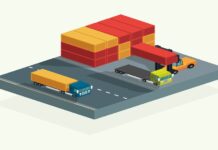Blockchain technology is revolutionizing the way businesses handle supply chain management by fostering unprecedented transparency and improved efficiencies. Often likened to a digital ledger, blockchain records transactions securely and immutably, offering stakeholders real-time visibility into the journey of goods from origin to destination. This cutting-edge technology addresses longstanding challenges faced by supply chains, such as tracing product origins, verifying authenticity, and reducing documental errors. As industries continue to adopt this innovation, the future of supply chain transparency looks promising and transformative.
Understanding Blockchain Technology in Supply Chains
Fundamentals of Blockchain Technology
Blockchain technology is essentially a digital ledger that records transactions across multiple computers in such a way that the registered transactions cannot be altered retroactively. This decentralized digital ledger comprises of blocks that store data in a chronological and immutable fashion. Each block includes a unique cryptographic hash of the previous block, a timestamp, and transaction data. The decentralized nature of blockchain means no single entity controls the entire chain, which ensures tamper resistance and enhances the overall security of the data.
Key Features Relevant to Supply Chain Management
In the context of supply chain management, blockchain offers several key features that can transform how entities handle their operations:
- Decentralization: No central authority governs the data, reducing the risk of data manipulation.
- Transparency: Every transaction is recorded on the blockchain, making it visible across the network.
- Immutability: Once confirmed, data cannot be altered, ensuring its accuracy over time.
- Consensus-driven: Transactions are verified and agreed upon by network participants before being recorded.
These characteristics collectively enable a more efficient and transparent supply chain ecosystem.
How Blockchain Enhances Data Security and Integrity
The security advantages of blockchain for supply chains are particularly noteworthy. By eliminating the need for a centralized authority, blockchain ensures that all transactions are independently validated by the network, reducing the risk of fraudulent activities. Cryptographic hashes safeguard the integrity of the data, preventing unauthorized alterations. Furthermore, blockchain’s immutable nature ensures that any attempts at tampering are immediately visible, thereby preserving the integrity of the supply chain data.
The Impact of Blockchain on Supply Chain Transparency
Real-time Tracking and Traceability
Blockchain technology facilitates real-time tracking of products through every phase of the supply chain. Each entity involved can update information instantaneously, making the entire journey of the product visible at all times. This level of traceability helps businesses to quickly pinpoint and address any disruptions or inefficiencies. With real-time tracking, companies can respond faster to changing conditions and make more informed decisions to enhance operational efficiency.
Reducing Fraud and Human Error
Blockchain’s immutable ledger reduces the possibility of fraudulent activities and human error that often plague traditional supply chain systems. By automating record-keeping and validation processes, blockchain minimizes the need for manual interventions, thereby reducing mistakes that are typically caused by human oversight. As a result, the supply chain becomes more resilient to fraudulent activities, contributing to greater overall reliability and efficiency.
Enhancing Consumer Trust and Satisfaction
Greater transparency enabled by blockchain allows consumers to verify the authenticity and provenance of products they purchase. With access to detailed and immutable records of a product’s journey from origin to destination, consumers can make informed buying decisions, ensuring that they receive high-quality, ethically sourced goods. This level of transparency fosters trust between the brand and its customers, enhancing brand reputation and customer satisfaction.
In conclusion, blockchain technology stands as a formidable force in revolutionizing supply chain transparency, promising enhanced security, reduced fraud, and improved consumer confidence. As this transformative technology continues to evolve, its potential applications in optimizing supply chains can only expand, promising a more accountable and efficient future for industries worldwide.
Case Studies of Blockchain Implementation
Success Stories in the Food Industry
The food industry has witnessed significant transformations through the adoption of blockchain technology. One notable success story involves Walmart, which harnessed blockchain to enhance its food safety protocols. By integrating digital ledgers into their supply chain, Walmart reduced the time needed to trace the origin of produce from seven days to mere seconds. This remarkable efficiency helps to quickly identify and remove tainted products, safeguarding consumer health. This not only boosts transparency but also builds consumer trust by showing accountability and commitment to quality.
Moreover, IBM’s collaboration with food giants such as Nestlé and Unilever has further demonstrated the power of blockchain in food traceability. The IBM Food Trust platform has successfully enabled these companies to offer verified information about the journey of food items—from farm to table. These initiatives underscore the technology’s potential to revolutionize supply chain transparency in the food sector by ensuring product authenticity and enhancing operational efficiency.
Innovations in Pharmaceutical Supply Chains
In the pharmaceutical sector, blockchain technology has emerged as a tool to combat counterfeit drugs and ensure regulatory compliance. A success case is the partnership between IBM and KPMG, alongside Merck and Walmart, to create a blockchain pilot specifically designed for the U.S. Food and Drug Administration’s (FDA) Drug Supply Chain Security Act (DSCSA). This initiative aims to establish a secure and transparent system that tracks drugs throughout the supply chain, ensuring that consumers receive genuine products and are safeguarded from harmful counterfeits.
Moreover, Chronicled, a San Francisco-based company, has made strides with its MediLedger Project. Utilizing blockchain, the project standardizes the pharmaceutical supply chain and streamlines the process for meeting regulatory requirements across different jurisdictions. These implementations stand as testimony to blockchain’s potential to heighten security and traceability in pharmaceutical logistics.
Consumer Electronics and Blockchain Integration
Blockchain technology is proving invaluable in the consumer electronics sector by combating counterfeit products and fostering sustainable practices. Companies like Huawei have applied blockchain to enhance the transparency of their supply chains. By tracking every step of the production process on a decentralized ledger, Huawei is not only ensuring authenticity but also promoting ethical sourcing and environmental consciousness.
Similarly, tech giant Samsung has been exploring blockchain for logistics management, aiming to streamline processes and cut operational costs. Their initiatives focus on ensuring that consumers receive genuine products while simultaneously reducing inefficiencies within the supply chain.
Challenges and Considerations
Technical and Infrastructure Challenges
Implementing blockchain technology does bring its share of technical and infrastructure challenges. Firstly, the integration of blockchain into existing systems often requires a significant overhaul, necessitating robust IT expertise and infrastructure investments. The need for extensive data storage capabilities and high computational power can pose obstacles, especially for small- and medium-sized enterprises with limited resources.
Moreover, interoperability issues arise when integrating blockchain with legacy systems. Companies must ensure that their blockchain solutions align with existing technology infrastructures to avoid disruptions and ensure seamless operations.
Regulatory and Compliance Concerns
Navigating the regulatory landscape associated with blockchain technology can be complex. Different jurisdictions impose varying rules and requirements, making compliance a daunting task. Organizations must ensure that their blockchain operations comply with data protection laws, such as the General Data Protection Regulation (GDPR) in Europe and similar frameworks elsewhere.
As regulatory frameworks continue to evolve, companies must remain agile and informed to adapt swiftly. Collaborating with industry bodies and legal experts can aid in understanding and shaping these regulations.
Cost Implications and ROI Analysis
The cost implications of implementing blockchain technology can be prohibitive for some businesses. The initial investment for setting up a blockchain infrastructure, alongside ongoing maintenance and development costs, can be substantial.
Additionally, conducting a thorough ROI analysis is crucial to ensure that expected benefits outweigh costs. Companies must consider long-term gains such as improved efficiency, enhanced security, and increased transparency against the significant upfront and operational expenses. Pilot projects and phased rollouts can serve as valuable strategies to assess viability before committing to full-scale implementations.
Future of Blockchain in Supply Chain Management
The future of blockchain technology within supply chain management holds significant promise. As the technology continues to evolve, it is expected to integrate seamlessly with other innovations such as the Internet of Things (IoT), artificial intelligence (AI), and machine learning. This integration will not only enhance supply chain transparency but also create systems that can:
- Automate complex processes with incredible accuracy
- Optimize operations by providing predictive insights
- Ensure real-time tracking and reporting of goods
Moreover, the adoption of blockchain technology is likely to become more widespread as businesses recognize its potential for reducing fraud, enhancing security, and improving collaboration amongst all stakeholders. As these systems become more robust and accessible, we can anticipate a dramatic shift in how supply chains operate, leading to more sustainable and efficient practices industry-wide.

























